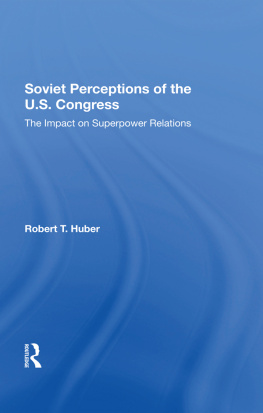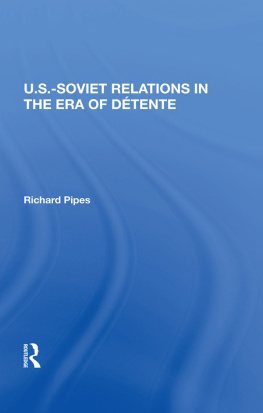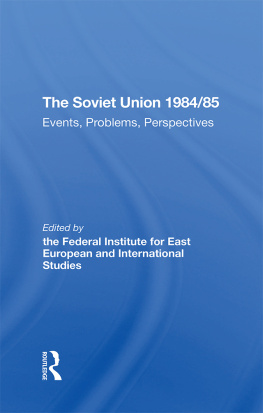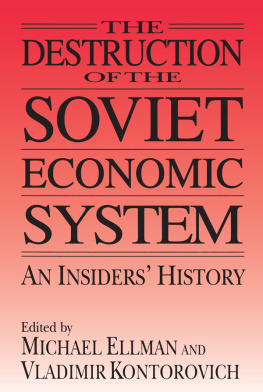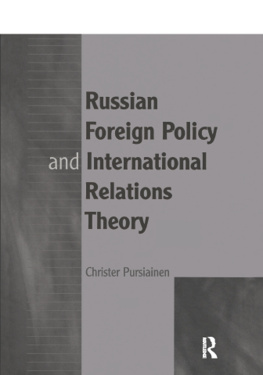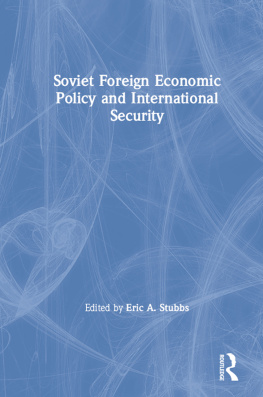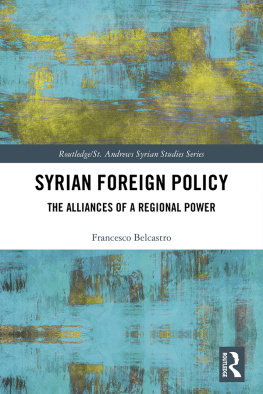THE SOVIET STATE
The Domestic Roots of Soviet Foreign Policy
The Royal Institute of International Affairs is an unofficial body which promotes the scientific study of international questions and does not express opinions of its own. The opinions expressed in this publication are the responsibility of the contributors.
The Soviet State
The Domestic Roots of Soviet Foreign Policy
Edited by
Curtis Keeble
First published 1985 by Westview Press, Inc.
Published 2019 by Routledge
52 Vanderbilt Avenue, New York, NY 10017
2 Park Square, Milton Park, Abingdon, Oxon OX14 4RN
Routledge is an imprint of the Taylor & Francis Group, an informa business
Copyright 1985 by Royal Institute of International Affairs
All rights reserved. No part of this book may be reprinted or reproduced or utilised in any form or by any electronic, mechanical, or other means, now known or hereafter invented, including photocopying and recording, or in any information storage or retrieval system, without permission in writing from the publishers.
Notice:
Product or corporate names may be trademarks or registered trademarks, and are used only for identification and explanation without intent to infringe.
Library of Congress Catalog Card Number: 84-52147
ISBN 13: 978-0-367-29605-6 (hbk)
Contents
Curtis Keeble
Hugh Seton-Watson
David Lane
Alastair McAuley
John Lawrence
David Dyker
Alec Nove
Alan H. Smith
Edwina Moreton
Stuart Kirby
Peter Frank
Malcolm Mackintosh
Archie Brown
Curtis Keeble
Archie Brown, St Antony's College, University of Oxford
David Dyker, School of European Studies, University of Sussex
Peter Frank, Department of Government, University of Essex
Curtis Keeble, H.M. Ambassador to Moscow (1978-82)
Stuart Kirby, Senior Associate, St Antony's College, University of Oxford
David Lane, Department of Sociology, University of Birmingham
John Lawrence, Keston College
Malcolm Mackintosh, Cabinet Office, London
Alastair McAuley, Department of Economics, University of Essex
Edwina Moreton, The Economist
Alec Nove, Centre for Development Studies, University of Glasgow
Hugh Seton-Watson, School of Slavonic and East European Studies, University of London
Alan Smith, School of Slavonic and East European Studies, University of London
This work had its genesis in an invitation by David Watt, at that time Director of the Royal Institute of International Affairs, to contribute to the Institute's series of studies on Soviet foreign policy. A more detailed outline for the study was then developed in collaboration with William Wallace and Adeed Dawisha, as a result of which we were able to start with a general scheme which remained largely unchanged throughout the later stages. At those first meetings it was particularly helpful to have the benefit of advice from Hugh Seton-Watson and the late Leonard Schapiro. It was a cause of particular sadness to all the members of the group that Professor Schapiro could not take part in the later stages of our work.
A volume such as this is the product of many hands. It is of course the individual contributors who have made it, not only by their own essays, but by the constructive spirit in which, at the meetings of the study group, they discussed and developed the initial drafts. To them and to the other participants in the study group I am deeply grateful.
The organizational support of Chatham House was invaluable. We owe much to the cheerful readiness of Ann De'Ath to tame the un tidiest manuscript, to the firm and meticulous hand of Pauline Wickham at the publication stage and above all to the wise and patient guidance of Geoffrey Goodwin.
June 1984
C.K.
Curtis Keeble
The conduct of relations with the Soviet Union has caused difficulty to successive Western governments from the time of the October Revolution to the present day. The experience of Soviet diplomacy over two-thirds of a century leaves us with the essentials of the problem unchanged, its significance sharpened by the rise of the Soviet Union to a nuclear superpower. Is Chernenko's Soviet Union Lenin's state writ large, with its policies firmly rooted in the political philosophy of 1917? Does it really see the world order in terms of a struggle between socialism and capitalism, in which socialism will inevitably triumph and in which the task of Soviet foreign policy is to ensure that the transition is accomplished tidily and safely? Has the old imperial Russian drive been absorbed into the new philosophy to create a force, uniquely malign in character, whose relationship with the West is, by its own choice, one of hostility, modified only by expediency? Or is this major power now guided more by its practical interest than by its ideology and so beset with its internal and imperial problems that it has more to gain from stability than from conflict? Has it now become a power with which the West can create a relationship necessarily characterized by ideological confrontation, but, for all that, safe, stable and on occasion, mutually beneficial? To pose the problem in these terms is, of course, to over-simplify it at the outset. There is in reality no simple choice among all-embracing policy concepts, in the real world, policy is the product of a multitude of separate acts, often with no clear linkage to an underlying philosophical concept, often uncoordinated and not infrequently conflicting. Yet, ultimately, in all their facets, the policies of Western governments towards the Soviet Union turn upon certain assessments, conscious or instinctive, about the nature and objectives of the Soviet state. It may, of course, be argued that there is nothing very remarkable about Soviet policy; that, in its essence, it is merely the policy which is to be expected from a continental imperial power, newly risen to superpower status and faced with the need to consolidate the areas under its control, to sap the strength of its opponents and to develop the means for world-wide projection of its power. This it is. But it is more. Our objective in this set of studies has been to look beneath the external manifestation of Soviet policies to the roots from which they spring.
Through their history, their political structure, their economic resources, their geographical location, their beliefs, through a whole range of mutually interlinking factors, states develop the characteristics which make each of them unique as an international personality and unique in reaction to any given set of external circumstances at any given time. It is only too easy to judge international problems in terms of their observable elements and to underrate the psychology of the protagonists. 'What kind of people do they think we are?' said Churchill. We paid heavily for failure to understand in time what sort of state Nazi Germany was. We are still paying for the failure of successive British governments to understand in time the mood of post-war Europe and the psychology of the founders of the European Community. Lord Franks' report on the events which led to the Falklands war offers yet another illustration. Officials and ministers recognized a situation which was moving towards armed confrontation, studied it with care and reached a reasonable conclusion on the basis of the observable evidence. Their conclusion, as Lord Franks observed, 'proved to be a misjudgement' and prominent among the reasons was the fact that 'sufficient allowance was not made for the possibility of Argentina's military government, subject to internal political and economic pressures, acting unpredictably'. It is only too easy to overlook the fact that those who form policy in any country, no matter how great their political power, are constrained to an extent which they themselves may not realize by the political, social and ideological climate in which their own ideas have developed; by the geopolitical situation of their country; by the military and economic resources they can deploy; and by the individuals and institutions through whom they must operate. Dearly though we have paid for past misjudgements, the price of error in relations with the Soviet Union is of another order of magnitude.




